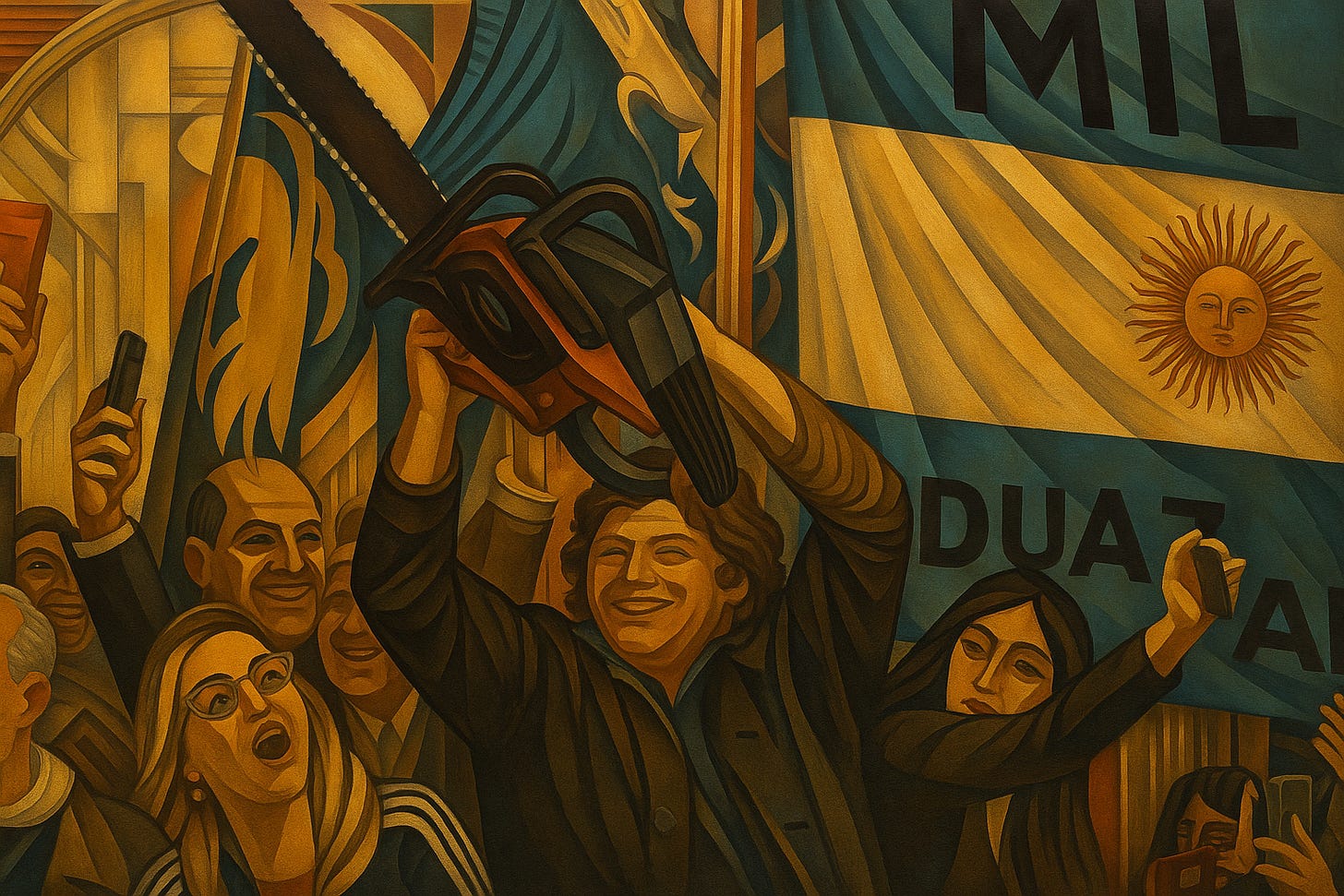The Case Against South African Fatalism
Argentina’s economic turnaround has left Keynesians frustrated and free-marketeers vindicated. But the real lesson for South Africa is that a slow sinking ship can be turned around.
Rather than asking whether Javier Milei’s shock therapy could “work” in South Africa—which invites all the usual ideological scuffles—this piece argues something else, namely that Argentina’s sudden recovery challenges the fatalism many South Africans have internalised about state reform, governance failure, and economic stagnation. I don’t argue that South Africa needs its own Milei (although I would not be sad to see one), but rather that we need to stop thinking that this ship will undoubtedly sink.
Milei’s libertarian project, for all its eccentricity, proves that a democratic government can reverse decades of decline, and do so quickly, dramatically, and without abandoning constitutional norms. That stands in stark contrast to South Africa’s political national mood, where real reform is endlessly chased but seldom achieved. Argentina had entrenched labour unions, populist legacy parties, and a bloated welfare state too. The difference wasn’t the institutions. It was the will and it was the electoral mandate given.
It turns out that governments can, in fact, change course. That a country deep in crisis doesn’t need a technocrat or a tyrant to impose order. It just needs someone willing to act like the crisis is real.
South African politics, by contrast, treats crisis as an everpresent background condition unchangeably with us due to our country’s history. Policy papers are endlessly written and a litany of task teams are assembled. Yet on a national level we do not reform. South African policy-making is stuck in a Groundhog Day where our politicians wake up, reannounce the same reforms, and act surprised when nothing changes.
This was the case for a long time in Argentia too.
Two years ago, Argentina looked like a country doomed. Inflation above 200%. Half the population in poverty. A currency spiralling into worthlessness. And then, out of this wreckage, voters elected Javier Milei, a wild-eyed libertarian economist who campaigned with a literal chainsaw and a promise to slash the state down to its roots. The establishment laughed at his libertarian proposals and some braced for the “inevitable” collapse he would supposedly cause.
But the collapse didn’t come.
What came instead, remarkably, was recovery. Inflation fell. Growth returned. Investors, once skittish, piled back in. Rent prices dropped in real terms. The public deficit, for decades an immovable fixture of Argentine life (South Africans are quite used to these types of structural failures being treated as permanent facts of life like rolling blackouts or failing service delivery) was erased in a matter of months. And all of this was done through policies the average South African policy wonk would dismiss as reckless, politically naïve, or “unrealistic.”
Now this isn’t an argument for importing Milei’s programme wholesale. South Africa isn’t Argentina, and our problems, though similar in type, have different historical roots and social dynamics. But the Argentine experience should make it clear that our slow-motion crisis isn’t inevitable. It’s a political choice.
The Myth of the Unreformable State
A peculiar fatalism has taken hold in South Africa, especially among the professional class. Many assume that real reform is simply beyond reach, too politically costly or socially disruptive to attempt. So they emigrate to Europe, the US or their security estate. And this is not to blame them. South Africa’s challenges often seems insurmountable.
But Argentina was also written off as unreformable. Decades of Peronist patronage had created a bloated public sector, subsidised everything from electricity to football tickets, and convinced much of the population that markets were exploitative by default. Their unions were powerful and their political culture was allergic to austerity. Sound familiar?
And yet, in the face of that, Milei’s government cut spending by over 30%, fired tens of thousands of public employees, and shut down entire ministries. Rent control laws were scrapped. The money printer was unplugged. And after some initial pain like rising food prices, higher unemployment in state-linked sectors the results began to show. By mid-2025, inflation had drastically dropped, growth had rebounded, and even poverty began to fall.
How did this happen? The answer is both mundane yet revolutionary: they did the thing. They stopped pretending there was another way. Argentina’s crisis was real, and their response matched its scale.
What has been striking about Milei’s approach is not just its economic impact. It’s that it’s been achieved (so far) without violating democratic norms. He hasn’t suspended elections or silenced opposition parties. His reforms, though aggressive, have mostly been pursued through the legislature or via lawful presidential decree. In fact, his coalition is a fragile one, and much of his agenda has required negotiation and compromise. This is not the profile of a strongman and we’ve seen with the current populist revolution we’re seeing over the globe. It does seem that Milei takes democracy as seriously as he does his free market convictions.
Compare that to South Africa, where major reforms—from labour deregulation to education overhaul—have been promised but postponed indefinitely due to their clinging to fail ideology.
Conclusion
You don’t have to romanticise Milei and we don’t need the same kind of theatrical libertarianism. But we do need politicians who are doers of deeds (to borrow from Rooseveldt’s famous speech) and not the critic who refuses to accept that South Africa’s project with centralisation, redistribution and state-led development has failed.
For years, Argentina was the go-to cautionary tale for what happens when states lose their fiscal discipline. It’s where commentators and analysts pointed when someone warned about Eskom or the public wage bill. Now, suddenly, it’s a case study in how fast things can turn around if a government is willing to act like and admit that there is actually an emergency.
South Africa, by contrast, remains stuck. We have rituals of accountability rather than accountability itself. South Africa has the performance of reform rather than actual reform. We debate inequality in abstract terms while 60% of young people sit unemployed. We bemoan poor service delivery, but never honestly touch the underlying centralised and state-led structure that produces it. Even now, the most radical proposals on the table are from the same ideological tent as what caused the problems.
The irony is that South Africa still has more institutional capacity than Argentina did when Milei took office. Our courts are stronger (despite challenges and jurisprudential dogma). Our civil society is more robust. We have functional banks, a relatively independent Reserve Bank, and a constitution that still commands legitimacy. If anything, we are better positioned for serious reform than Argentina ever was.
Reform can still come. But first South Africans need to admit that the current model has failed, vote out the statists who built it, stop replacing them with parties offering more of the same and get on with it.
More articles:
If you found this piece worthwhile, feel free to share it with someone who might appreciate it.
To get future essays delivered directly to your inbox, you can subscribe here:
I welcome thoughtful conversation—feel free to reach out on LinkedIn or follow along on Twitter.
An edited version of this article was published on Business Live. If you'd like to support my writing please subscribe and consider a pledge.
This cover image was created using ChatGPT.







Ek is mal oor die artikel, Daniël, en deel jou sentiment grootliks. Net een kwessie om in gedagte te hou: die aantal ontvangers van staatswelsyn in Argentinië in 2023 word geraam op ~10 miljoen uit 'n bevolking van ~45 miljoen. Dis proporsioneel minder as helfte van die hoeveelheid tans in SA.